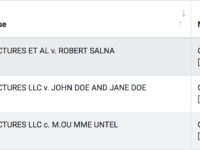In December 2017, the government launched its copyright review with a Parliamentary motion to send the review to the Standing Committee on Industry, Science and Technology. After months of study and hundreds of witnesses and briefs, the committee released the authoritative review with 36 recommendations that include expanding fair dealing, a rejection of a site blocking system, and a rejection of proposals to exclude education from fair dealing where a licence is otherwise available. The report represents a near-total repudiation of the one-sided Canadian Heritage report that was tasked with studying remuneration models to assist the actual copyright review. While virtually all stakeholders will find aspects they agree or disagree with, that is the hallmark of a more balanced approach to copyright reform.

Fair Dealing by Giulia Forsythe (CC BY-NC-SA 2.0) https://flic.kr/p/dRkXwP
Copyright
Canada Introduces USMCA Implementation Bill…Without a General Copyright Term Extension Provision
The Canadian government tabled Bill C-100 yesterday, the bill to implement the Canada-US-Mexico Trade Agreement. I will have future post on the key provisions, which include new criminal provisions on trade secrets and tampering with rights management information. The bill also features several provisions related to copyright term but notably does not touch the current general copyright term of life of the author plus an additional 50 years. There are several new terms included in the bill with extensions for anonymous works, performances in sound recordings, sound recordings, and cinematographic works. The bill expressly states that none of the extensions are retroactive which means that the works that are currently in the public domain will remain there even after the new terms are established.
The “Bulte Report” Redux: Canadian Heritage Committee Releases Embarrassingly One-Sided Remuneration Models Study
The Canadian government announced its plans for a copyright review in December 2017, tasking the Standing Committee on Industry, Science and Technology with the review. That report has been in the drafting stage for several months and is expected before the summer. In an effort to dampen concerns that Canadian Heritage would play a diminished role in the review, the responsible ministers asked the Industry committee to ask the Heritage committee to conduct a review on remuneration models for artists and creative industries. The formal request asked the Standing Committee on Canadian Heritage to “call upon the expertise of a broad range of stakeholders impacted by copyright to ensure a holistic understanding of the issues at play.”
The LawBytes Podcast, Episode 10: Lowdown on Lawsuits – James Plotkin on Copyright Threats, Notices, and Lawsuits
Copyright threats and lawsuits against individuals have been around in Canada since 2004, when they were rejected by the federal court. Those threats receded for about a decade, but now they’re back. Copyright notices, litigation threats, settlement demands, and actual lawsuits have re-emerged at the very time that the music and movie industries are experiencing record music streaming revenues in Canada and massive popularity of online video services. James Plotkin, a lawyer with Caza Saikaley in Ottawa, joins the podcast this week to help sort through what the notices mean, the implications of the threats and lawsuits, and where Canadian law stands on the issue.











